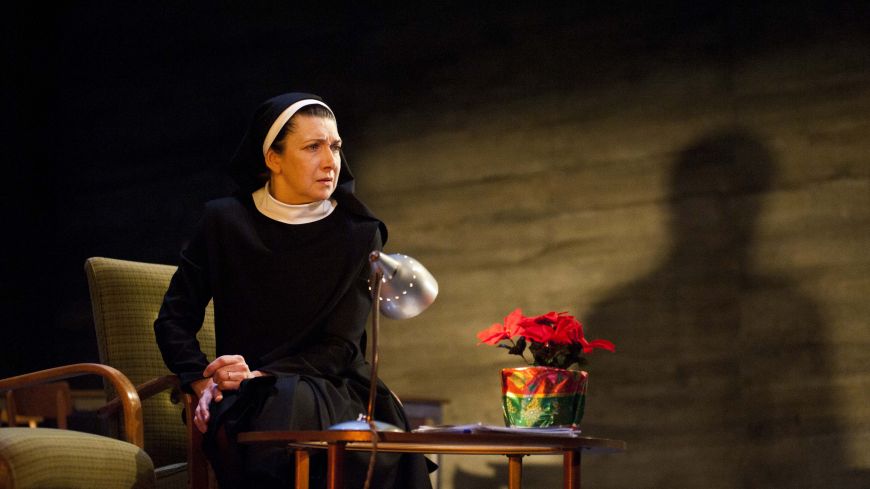
In 1986 Dr David Snowdon, a leading neurologist at the University of Kentucky, embarked on a revolutionary scientific study of Alzheimers disease. His long term research assessed the ageing process of nearly 700 Catholic nuns aged between 74 to 106, an ideal focal group sharing the same lifestyle, food, medical care and social situation.
His book, Ageing with Grace, concluded that linguistic ability, good diet, exercise and a positive attitude decreases the risk of dementia and assist with a longer, healthier life.
Writer Abi Morgan is renowned for her work in film, TV and theatre, including the screenplay, Brick Lane and the BBC series, The Hour. She was inspired by Snowdon’s research to create this illuminating play about a similar study into the mental health of nuns in a small convent in Scotland. Abi also met two elderly nuns on a train to Edinburgh, an encounter in which she learnt that they were “ a dying breed” with only five left in their sisterhood.
The vast, virtually empty, open stage is surrounded by the towering high stone Convent walls like an ancient Castle. The enclosed, silent space reflects the contained, constrained private world of women and their devoted life to good works and prayer.
But the ambience is soon to change. Enter, the smart, sassy young American scientist, Dr. Helen Jarvis, and her colleagues, Dr. Jonathan Lees and Dr. Richard Garfield. Welcoming them is Mother Superior, the thoughtful, caring, Sister Miriam, fussing over their preference for coffee or lemonade.
And then with a flurry, Sister Ursula rushes into the grand hall, her hair wet and head uncovered. Rather embarrassed, she explains she has just had a swim outside. Through the wide picture window, there’s an idyllic tranquil view of the surrounding countryside and tree lined lake.
The visiting doctors appear out of place in the Convent – Helen’s short skirt and high heels compared to the Sisters’ long black habits and sandals. As dusk falls, the soft lighting casts a dark shadow across the room, as Helen stands in silhouette looking out at the night sky.
Time for reflection indeed as the Mother Superior in consultation with her Sisters, decides to accept the research study of the older nuns who must consent to donate their brain to medical science after death.
Over the next few years, their peaceful environment is interrupted by the research team who conduct memory tests and interviews to gauge any psychological decline and signs of dementia. Moments of light hearted humour too - the nuns cannot be disturbed by the doctors during their favourite TV shows, Midsomer Murders or Countdown.
Maureen Beattie captures Sister Ursula’s girlish innocence and exudes a warm and vivacious energy, in contrast to the calm, composed manner of Sister Miriam, (beautifully portrayed by Colette O'Neill) who is slowly ageing with gentle grace.
Dr Richard Garfield is played with nonchalant charm by Nicholas Le Prevost, ( a star of TV crime series such as Poirot and Midsomer Murders!) and nicknamed the “Errol Flynn of the medical world,” by Ursula. for his suave Hollywood actor style. Shy and withdrawn in his company, she concentrates on work, caring for Audrey, the teenage novice, and not least her daily energetic swims in the cold loch as if this is a penance for sinful thoughts.
What ensues is a heated debate between the scientists over the wider issue of financial support and necessary publication of articles and books. The Nuns consider their own personal views and beliefs about human life, illness, death and the hereafter. For each side, it’s about conflicting beliefs, sexual attraction and celibacy, love and loneliness, scientific fact and spiritual faith.
During the interval, I hear a woman chatting to her friend over a glass of wine. “A bit wordy, don’t you think?” I could not understand this comment. The essence of theatrical performance is about language, conversation, rhetoric, ideas and storytelling.
What could offer a more dramatic - and "wordy" - scenario than an exploration of two strong, opposing forces, religious faith and modern medical research.? What happens when they collide? This sharp, well observed play is astutely directed through a fast flowing series of intimate vignettes, and performed with poignancy and passion.
Show times
21st October to 12 November, 2011

